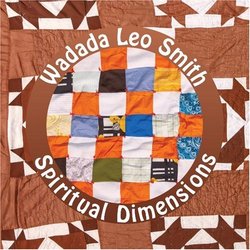MORE GOOD CHALLENGING MUSIC FROM WADADA LEO SMITH'S TRUMPET
Stuart Jefferson | San Diego,Ca | 10/10/2009
(4 out of 5 stars)
"Two discs 56 and 63 minutes each approximately. The sound is very good-clean and spacious. The notes are minimal-song titles,times,where recorded,and who's playing on which disc.
This is a double disc of Leo Smith,recorded live-disc one at Vision XIII,N.Y.City,in 2008,and the second at Firehouse,in Conn.,2009. The group on the first disc comprises Smith-trumpet,Vijay Iyer-piano and synthesizer,John Lindberg-bass,Pheeroan AkLaff-drums,and Don Moye-drums. The second group is Smith-trumpet,Michael Gregory and Brandon Ross-electric guitar,Nels Cline (WILCO)-6 & 12 string electric guitar,Lamar Smith-electric guitar on the first and last tracks,Okkyung Lee-cello,Skuli Sverrisson-electric bass,John Lindberg-acoustic bass,and AkLaff-drums.
This is a continuation of Wadada Leo Smith's journey into improvised music. All the compositions are by Smith,and he continues to push the boundaries of improvisational music while still staying grounded (for him) somewhat in the jazz tradition. Saying that,this music doesn't swing like most people's idea of jazz. Smith has his own sense of musical time and style of arranging his compositions,which are really apparent in a live setting. This music has a start-stop feel to it,yet it flows together into a seamless whole-the spaces between the notes being as important as the sounds made by the band. There are passages of quiet sounds,only to have one or another of the band introduce a new sound into the mix,which keeps the listener's attention throughout these tracks. The more you listen the more you'll hear,which is very rewarding,especially in today's musical climate.
On both sets,not enough can be said for the drummer AkLaff. He and Smith have developed,over time,an almost telepathic rapport,and it shows time and again on both these sets. On the first set,Iyer,who is fast becoming well known in jazz circles,plays an important role in these compositions,with Smith relying heavily on his playing. The fine bassist Lindberg,who played many years ago with a more experimental string trio jazz group in N.Y.,and then played with many others since,plays all over his instrument. Not so much grounding the rest of the group as becoming an integral player in the compositions. Don Moye,another fine but fairly unknown drummer,is a perfect foil not only for the group but for AkLaff. As usual for Smith's work,there are a lot of open spaces in the music,and at times his trumpet sound recalls Miles Davis in his later years,when he seemed to play only a few notes,but they were the ones that counted.
The second disc starts immediately with some of that Davis trumpet sound-sad and lonely,which gives way to the other players. This sets the tone for the other tracks,which seem to only improve the further you listen to this concert. All the tracks on this disc are fairly long-two in the 12-13 minute range,and the other two 18 plus minutes each. This allows each player room to fit in their pieces of the music,and then slip back into the group, (or lay out altogether) while another musician makes his contribution. This concert,relative to the first disc,is much busier sound-wise. The guitarists are put to good use,creating sound (s) which form an integral,but very subtle,part of these compositions. There is much more here to sink your teeth into,because the players are busy creating their own sounds,which never seem to step on any of the others. Once again,this shows Smith's arranging abilities,and his commitment in advancing jazz composition,and with it,jazz itself. There is no grand standing,no show of egos here. Each player came to this music to play their best and to produce a group sound. A lot of the playing is subtle-sounds and note clusters are introduced only when it benefits the composition.
This is not your usual jazz,played by the usual standards. This is intelligent,well thought out,well played music by one of the most important musicians working in jazz/composition today. For those who haven't heard Wadada Leo Smith-this is a good place to start. The music is certainly challenging,but not so far out as to be unrecognizable by jazz listeners. For long time listeners of Smith,this is a good continuation of his journey through jazz,utilizing his compositional skills and some of the best musicians in this style of jazz. For anyone who likes late-period Miles Davis,this music (especially the second disc) will sound a bit familiar without being a slavish imitator of that sound. Don't think this is Davis redux-its definitely not. This is important,good music that deserves to be heard by listeners who like something a bit challenging,without going to far "outside". Don't let the first few tracks fool you,the further you listen to these concerts,the better your understanding (and enjoyment) of Smith will be. Leo Smith is one of only a few jazz musicians today who is advancing jazz for all of us."


 Track Listings (5) - Disc #1
Track Listings (5) - Disc #1